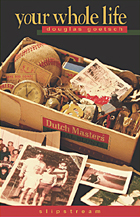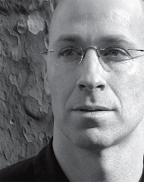
|
"Here is a poet who is fully engaged in the world and with language, and who makes no concessions to political correctness or the industry of consolation. Instead, Goetsch fearlessly explores the culture at large and
his own emotions, zestfully exposing the thoughts we usually hide from others and even ourselves. 'Have you ever felt the world was full of edges?' Goetsch asks, and he can't keep himself from going right to those edges,
whether he is writing about the entanglements of adult life, the cluelessness of childhood, or, as he so deftly does in several poems, both at once. The result is a poetry that is unforgiving, moving, and often very
funny."
— Jeffrey Harrison
Your Whole Life Copyright 2007 by Douglas Goetsch
|
Poet Bio: Douglas Goetsch
 Douglas Goetschís books of poetry include Nobodyís Hell (Hanging Loose Press, 1999), The Job of Being Everybody (Cleveland State, 2004)—winner of the CSU Poetry Center Open Competition—and three chapbooks. He is the recipient of the Aldrich Award, the Paumanok Prize, the Permafrost Prize, awards from Prairie Schooner, The American Journal of Poetry, The Chautauqua Literary Journal, two fellowships from the New York Foundation for the Arts and numerous Pushcart Prize nominations. His work has appeared in Poetry, The Iowa Review, Ploughshares, ONTHEBUS, The Threepenny Review, The New England Review, online at PoetryDaily and Garrison Keillorís The Writerís Almanac, on the air at NPR, and in many anthologies.
Douglas Goetschís books of poetry include Nobodyís Hell (Hanging Loose Press, 1999), The Job of Being Everybody (Cleveland State, 2004)—winner of the CSU Poetry Center Open Competition—and three chapbooks. He is the recipient of the Aldrich Award, the Paumanok Prize, the Permafrost Prize, awards from Prairie Schooner, The American Journal of Poetry, The Chautauqua Literary Journal, two fellowships from the New York Foundation for the Arts and numerous Pushcart Prize nominations. His work has appeared in Poetry, The Iowa Review, Ploughshares, ONTHEBUS, The Threepenny Review, The New England Review, online at PoetryDaily and Garrison Keillorís The Writerís Almanac, on the air at NPR, and in many anthologies.
Goetsch grew up in Northport, Long Island, was educated at Wesleyan University and New York University, and resides in New York City. He has been on the writing faculty at The Frost Place, The Dodge Poetry Festival, The Iowa Summer Writing Festival, the Winter Poetry and Prose Getaway, and numerous other conferences and university programs. For
21 years he was a New York City school teacher, and is now exploring other fields. He is founding editor of Jane Street Press.
> Visit Douglas Goetsch's home page at janestreet.org
|
|
Stanley Avenue
A summer breeze lifts white gauze curtains,
carrying sounds of neighbors
unloading groceries, children playing
Marco Polo, a lawn mower in the distance
and the 96 bus snaking up Castleton.
None of it disturbs the naked woman
resting on the bed, her heel kissed by the sun
throwing its lattice of shadows over the rug
and up the wall, the angles sharpening
as the day drifts forward aimlessly as smoke.
But a timeless afternoon demanding nothing
disturbs the half-dressed man lying next to her
even as he strokes what he loves most—
her milk white flank curving to her hip.
Heís working on joy; it isnít going well.
Either he doesnít feel it, or he feels too keenly
joyís transience, knowing the only thing
that can possibly follow good weather is bad.
It would be easier to dwell in certainty,
depart this house, go back to his own,
a shack he should start readying for winter.
Itís not really a home—leaving is more
his home. Each time he hears the horn
of the Staten Island Ferry three miles off
a voice says You missed it.
But the woman on the bed is small
and beautiful, and the sight of her—
resting with an undefended heart—
fills the man with wonder, as though
she were performing a deadly stunt,
every muscle in her body slack
except her mouth, kissing him back.
Copyright ©2007 Douglas Goetsch
Gone
Itís easy to want someone dead.
Take this guy who removed
the muffler from his Harley,
now tearing down the block
at 3 a.m., or the dickhead
flicking a lit cigarette from his car
to the sidewalk. Something tells
me the woman tossing chicken
bones under the bus seat, now licking
her fingers, is of no use to the world.
Doubtless if they were weeping
in confessionals over their small
though highly revealing offenses,
or scribbling apologies in journals,
Iíd feel differently. And donít get
me wrong: Iíd rather not be the one
to gun down the Harley guy—
though there are excellent sight—lines
from my fire escape. Iíd just
as soon he plunge quietly into
a tectonic gap in 7th Avenue,
volunteer for long experiments
in orbit, beta test those new
exploding cell phones.
I never feel this way toward kids
I teach in the detention center,
though when theyíre older, fully
tattooed and towering over me
with hardened contempt, hollering
back to one another as they march
in gangs through the subway car—
yeah, maybe then Iíll want them
gone. They tell me they want to die
young, draw graffiti that translates
to leaving a good corpse. They brag
to one another about throwing
their dogs off the roof, and how
badly their stepfathers beat them.
When I was six my fatherís father
shuffled to where I was playing
on the living room rug, took my
head in his hands and rammed it
into the coffee table. I later was told
heíd been down the hall trying
to take a nap and heard me laughing.
I was six and he flung my head
into a table. Heís dead now. What else
do you need to know about him?
Copyright ©2007 Douglas Goetsch
|
The Kingdom
A little girl in her Halloween princess costume,
purple and white, thin satin or polyester,
a slit in the sleeve, a sweatshirt underneath
her mother made her wear over her screams.
Still, she couldnít be more excited, waving
her cardboard wand. Children need so little;
pennies for the fountain, bread for the sparrows.
You tell them to sit on the floor and they do.
Even rich kids know thereís nothing better
than a tree house, creaking in the wind.
Talking into tin cans, gazing down at the rain,
they understand what a kingdom is, though they
canít know theyíll spend their lives trying
to get back to that high throne, that cardboard
wand with which they conjured a future
so different from the one that arrived.
Copyright ©2007 Douglas Goetsch
|
|



